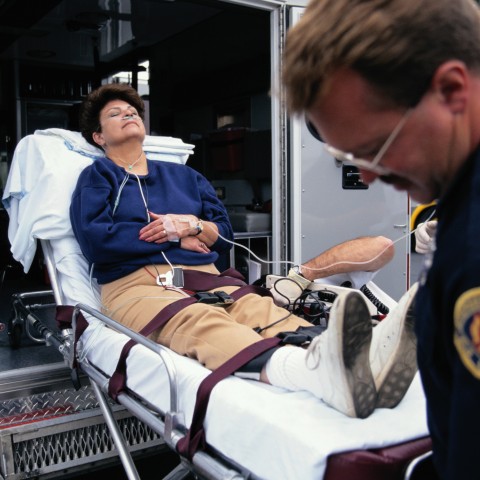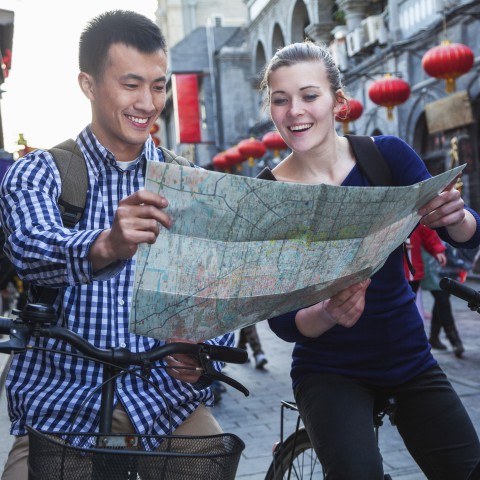Traveling to foreign countries is nearly always an exciting, enriching, and beneficial experience. Yet, some things can be real downers, such as boredom on a lengthy flight to Kenya. Really, binge-watching onboard movies can only be interesting for so long! And jet lag – another huge downer. Did you know that jet lag is more severe when you travel from the West to the East?
Well, we won’t know how to beat that, but there are fortunately plenty of remedies around to investigate.
To beat flight boredom, though, we may have the answer for you at SwahiliPod101! Why don’t you take the time to study Swahili travel phrases? We make this super easy and fun, with great downloadables, like our PDF Cheat Sheets. Quickly memorize these, and impress your Kenyan friends or travel guide with your flawless Swahili!
Table of Contents
- Importance Of Learning Travel Phrases
- 13 Must-Have Travel Phrases and Words
- Good-To-Have Travel Phrases
- Ways To Improve Communication in a Foreign Country
- SwahiliPod101 Can Help You Master Travel Phrases Easily and Effortlessly!
1. Importance Of Learning Travel Phrases
Impressing Kenyan people or your travel partners will be the least of the benefits you reap from learning these helpful phrases. These are greater ones:
1) Eliminate Travel Frustration: First of all, you’ll be able to cut out a good chunk of travel frustration and inconvenience due to language barriers.
Know how to pronounce and use at least the basic Swahili phrases, and then just look foreign. This should go a long way to help you get by and win you friends, because locals would be more inclined to help someone who took the trouble to learn a smidgen of their language.
2) Emergency Readiness: In case of an emergency, you will be able to get help a lot quicker if you know how to ask for what in Swahili. Imagine miming to a doctor or nurse that you have a sore ear but that you’re allergic to penicillin. Not so easy, right?
Rather, you should know basic emergency travel phrases, especially if you suffer from a serious condition. Also, information about life-threatening allergies you have should always be on your person in the language of the country you’re visiting.
3) Sight-Seeing Readiness: Hopefully, you also travel to learn more about a country’s culture. Visiting the main tourist sites in Kenya will be more interesting if you know how to ask pertinent questions in Swahili.
In this blog, we’ll also be giving you important travel phrases to consider – from the 13 essential must-have phrases to ones that are just generally useful and good to know.
Let’s get cracking!
2. 13 Must-Have Travel Phrases and Words
Seasoned explorers of multiple countries will tell you that certain words and phrases are absolute must-knows in anyone’s travel vocabulary. Learning from them, we collated some of the most essential ones here for you.
If you know these travel phrases and words by heart in Swahili, you will be much better equipped for your visit than most of your movie-binging travel mates.
1) Asante (Thank you)
As a tourist, you will be relying on the kindness of strangers to get by. Repay them with a small acknowledgment of their friendly generosity – know how to say “thank you” in Swahili.
2) Unaweza ongea kingereza? (Do you speak English?)
While it may be a bit of a cop-out, sometimes you just can’t figure out how to communicate. Maybe you’re blanking on one specific word you need, maybe they’re speaking with a heavy accent, or maybe it’s just really late and you really want to get to the hotel. In that case, try asking if they speak English, and hopefully you can make things a little bit simpler for yourself.
Don’t abuse this phrase, though! If you just try to get by without learning any of the local language, not only will you not learn anything – you’ll be out of luck if they can’t speak English!
3) Je, kuna basi kutoka uwanja wa ndege hadi mjini? (Is there a bus from the airport to the city?)
Public transit is usually cheaper, if slower, than taking a taxi or rideshare. Use this phrase to see if you can get where you’re going when you’re strapped for cash, or just when you’d like to take the scenic route into town!
4) Hii ndio basi ya hakika ya uwanja wa ndege? (Is this the right bus for the airport?)
Likewise, if you’re the kind of person who can get themselves moving early (or maybe you just have a late flight), maybe you want to take the bus to the airport rather than taking a cab. If that’s the case, you’ll want to be sure you’re actually heading the right way! You wouldn’t want to end up at a lookout point half an hour away, watching your flight take off in the distance, would you?
5) Niwie radhi, nauli ni gani? (Excuse me, what’s the fare?)
If you are paying for a cab, you’ll want to know how much. Most legal taxis will have meters, but when dealing with a currency you’re not familiar with, it can be worth asking just to double check that you’re paying the right amount – especially if the currency has cents.
6) Nina hifadhi (I have a reservation)
This one you can expect to use at least a few times throughout your trip, unless you’re the kind of person who travels by the seat of their pants and just goes to whatever hotel, motel, or hostel has rooms available.
7) Je, una nafasi yoyote usiku wa leo? (Do you have any vacancies tonight?)
If that’s the case, you’ll definitely be using this phrase instead. Quite possibly a lot, depending on how lucky you are!
8 ) Hicho kituo cha treni kiko wapi? (Where is the train station?)
If you’re in a country with an expansive commuter rail system (or maybe just a fan of other types of locomotives), you may want to know where the closest station is. Just don’t go looking for pennies on the rails!
9) Mimi nina mzio wa karanga (I am allergic to peanuts)
Replace “peanuts” with whatever the word for your allergen may be. If your allergy is serious, you probably already know the importance of stating this very clearly in Swahili.
If the condition is life-threatening, be sure to have a letter or prescription from a medical professional in Swahili on your person at all times. Consider getting a medical alert bracelet specially made in Swahili if your stay will be longer than a month or so.
10) Je, una chakula chochote cha wanavejeteriani? (Do you have any vegetarian dishes?)
If you dislike eating certain things, or you have certain dietary restrictions, it would be best if you knew how to convey this clearly in Swahili.
Remember, though, that saying “I’m vegan” or “I’m diabetic” may not be enough to get you what you want. The rules for veganism and vegetarianism are not standard everywhere in the world. Also, your patron might not understand what “diabetic” means. If you have a medical condition, it would be best to research some in-depth vocabulary beforehand.
11) Je, mimi ningeweza pata ramani? (Could I get a map?)
Planning on exploring your destination? Hopelessly lost? Maybe just an amateur cartographer? No matter the reason, this phrase is sure to come in handy. That said, you’re more likely to get use out of it at some sort of tourist or travel center than you are asking a random passerby on the street.
12) Hii ni pesa ngapi? (How much is this?)
Even if you’re not a big shopper, you’re probably going to need this phrase at some point. Knowing how to count in Swahili will, of course, help a lot with purchases too.
13) Je, wewe huchukua kadi ya mikopo? (Do you take credit card?)
This is another travel phrase that will smooth your monetary transactions considerably.
3. Good-To-Have Travel Phrases
Unlike the previous phrases, these are not really essential so much as they are useful. Yet, knowing these will still smooth over some bumps on your journey, more than just knowing the crucial phrases would.
1) Hio Wi-Fi ni bure? (Is the Wi-Fi free?)
If you’re abroad, your normal cellular plans probably won’t have any service, and you’ll be totally reliant on publically available Wi-Fi while you’re out and about. Just ask a server, clerk, or attendant, and they’ll be happy to let you know. Just make sure you’re paying attention when they tell you the password!
2) Je, unaweza kuchukua picha ya yangu tafadhali? (Could you take a picture of me please?)
What would a trip be with no photos to commemorate the event? Just be sure to ask this of someone who actually looks like they’d be willing to, unless you’re willing to risk being given the cold shoulder or worse. If you’re at a tourist attraction, you’ll find that most people are more than happy to take one for you, so long as you take one of them as well!
3) Je, una mapendekezo yoyote? (Do you have any recommendations?)
Eating alone in a restaurant? Or going out with new Kenyan friends or business colleagues? Let them help you decide what to have.
4) Ningependa kuwa na kiti chenye hakivutiwi sigara, tafadhali (I’d like to have a non-smoking seat, please)
Though smoking has gone out of fashion in some places, it’s still popular in others. In the event you’re at a restaurant where smoking is allowed on premises, you can always ask this question to the staff and be seated elsewhere.
5) Maji, tafadhali (Water, please)
If you’ve emptied your glass, or are cutting yourself off after a few drinks, you can always ask for some water. It can be especially useful if the restaurant is busy to the point you need to call out to someone to get service.
6) Ningeweza kupata cheki? (Could I have the check?)
To finish off the restaurant related phrases, if you’re eating with friends or really want to impress your colleagues, taking the bill can be a nice treat for them. Of course, this phrase could come in handy as well if you’re eating alone and you’re just impatient to leave.
7) Nini unapendekeza kama kumbusho? (What do you recommend for a souvenir?)
Now that your trip is over, what better way to cap it all off than a memento, or maybe a gift for friends and family at home? It’ll be nicer to have something recommended by the locals than a cheap bauble from the airport store, so go ahead and ask someone you’ve met what they think.
4. Ways To Improve Communication in a Foreign Country
When traveling, it’s possible to keep communication smooth when you don’t share a language.
Do so by keeping these five tips in mind. They are aimed to help you communicate with those who cannot speak English very well, and also to keep your traveling experience pleasant!
1. Keep your English simple and easy to understand.
If the person you are talking to speaks very little English, use basic verbs, adjectives, and nouns, and keep sentences short.
However, don’t patronize them by talking in pidgin or like you would address a child. Keep your speech simple but natural, and use the correct grammar.
For instance, don’t say: “You come when?”. If you say: “When will you come?”, you will very likely be understood, and may even help someone who wants to improve their English.
2. Ask someone to write information down.
Apply Rule 1 first at your hotel, where the staff is very likely to be able to speak some English. Get them to write down, in their native language, things like: “I would like to go to the airport, please,” “Please take me to the beach,” or “Where is the closest bathroom?”
These written questions are something you can then give to taxi drivers or any other people who are willing and able to help you. This simple step could make your life a lot easier when you travel to a foreign country!
3. Avoid asking leading questions!
If you want the correct information from a non-native English speaker, that is.
When you need directions, for instance, don’t ask: “To get to the bus stop, do I need to turn left here?” If the person didn’t really understand you, you will probably just get a smile and a “Yes,” which could possibly make you miss your bus.
Rather, you should ask: “Where is the bus stop?” If they understand you, you will get the correct directions.
4. Pick the right person to ask for help.
Time to look at people and think a bit about their appearance! A younger person who looks like they might be a student is more likely to have English skills than the friendly but ancient lady smiling at you from a fruit stall.
If you don’t see anyone like that, head into town to the nearest bank, hospital, pharmacy, or hotel. The staff at those places usually speak a bit of English.
5. Know when to quit.
If you stuck to the above rules, but the person you are talking to only stares at you blankly, say thank you and leave. Hanging around hoping someone will suddenly understand and respond is just wasting your time, and may irritate them as well. Go find someone else.
5. SwahiliPod101 Can Help You Master Travel Phrases Easily and Effortlessly!
So, reader, have you found this article helpful?
Do you feel comfortable enough to use some essential travel phrases in Swahili? We’d also love to hear if you think we left out important travel phrases. Leave your suggestions and opinions in the comments!
SwahiliPod101 takes the lead with many free learning tools to help you master Swahili reading and speaking easily, and in fun ways.
These tools include:
– An extensive vocabulary list, regularly updated
– A new Swahili word to learn every day
– Quick access to the Swahili Key Phrase List
– A free Swahili online dictionary
– The excellent 100 Core Swahili Word List
– An almost limitless Lesson Library for learners of all levels
You will also have access to topic-specific recordings like our Before You Travel: Survival Phrases lesson.
Learn even more efficiently with the help of a personal tutor, after taking an assessment test to personalize and tailor your training.
Getting a tutor is also a good option if you meet challenges in your learning, or need to fast-track correct pronunciation and diction. Your very own friendly, Swahili-speaking teacher will be only a text away on a special app, anywhere, anytime – an excellent option for business persons!
Using a guided learning system that was developed by experts in language and online education, you’ll receive personal feedback and constant support to improve in no time. You’ll also be tasked with weekly assignments in reading, writing, and speaking to hone your Swahili speaking skills.
Imagine how impressed your Kenyan friends or colleagues will be when you display your excellent conversational skills! With SwahiliPod101, getting there will be easy and fun.



















